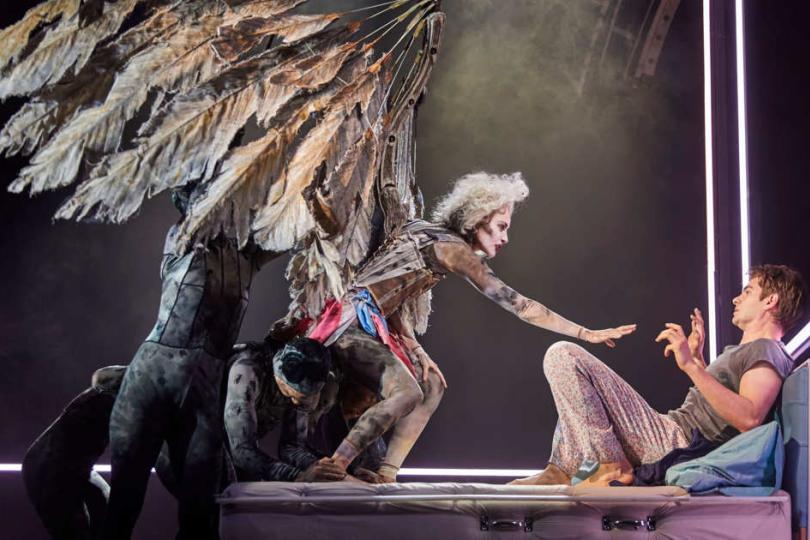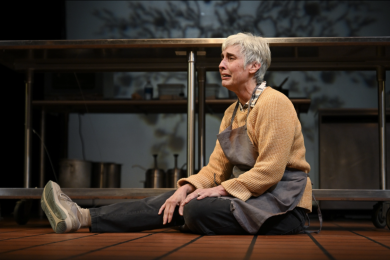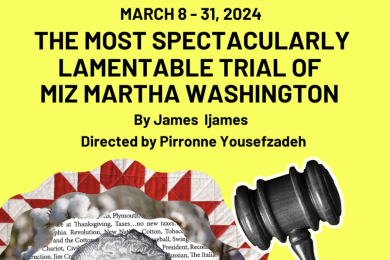The World Only Spins Forward: The Ascent of Angels in America

Many people consider the two-part, seven and a half hour Angels in Americato be the greatest American play ever written. I’m one of them. I also happen to know a little about its tortured gestation (the endless rewrites, the years of workshops). So I was more than a little excited when I read about a new book chronicling the making of Angels in Americathat commemorates the 25th anniversary of its opening on Broadway (and publicizes the new Broadway revival?).
As it turns out, The World Only Spins Forward is much more than a “making of” chronicle (as with recent books on Follies, Hamilton, The Great Cometand other shows). It is an exhaustive (but not exhausting) oral history based on 250 interviews, masterfully edited and woven into a series of conversations among a group of smart, funny, passionate people that examines every aspect of Angels in America: its historical and social background, its developmental process, its social and cultural effect, and its legacy in the 21st century. In the process, this book reveals a lot about the nuts and bolts of making theatre, the collaborative process, and the particular personalities of various creators.
The breadth of the research is phenomenal. The authors, Isaac Butler and Dan Kois, haven’t just interviewed people connected with many major productions and workshops of Angels(including Harry Waters, Jr.!); they haven’t just interviewed theatre professionals (including Joe Haj and Caryl Churchill!), they’ve interviewed politicians, historians, cultural critics, and LGBTQ activists. Then they created what I can only describe as a collage that makes it seem as if all 250 of them are sitting in a room together, talking about not just Angels in America but America itself.
In fact, the book starts off with an entire chapter about Ronald Regan’s America and gay culture, covering the years from roughly 1980-87. Before the book really begins discussing the origins of Kushner’s commission to write “an AIDS play,” the authors ground the reader in the world the play came from.
And then we’re on to the origins of the play itself. This part of the book, of course, is filled with outsized and entertaining personalities, none more outsized than Kushner himself. The man is, to put it mildly, a control freak. Who would want to work with a playwright perfectly capable of giving eight hours of notes and handing out new monologues to actors on the morning of a production’s opening? As it turns out, anyone who ever read the manuscript, even in its early stages. As Richard Eyre, artistic director of the National Theatre (where it was done before its Broadway run), said, “By page 2, I’d decided I wanted to do it.” (Note to playwrights: this is why we only need to submit 10 pages of a play to theatres.)
It’s full of insights into the collaborative process of theatre. For example, one of the most gloriously theatrical devices, the cross-gender casting with actors playing multiple roles, came from the fact that the NEA gave the money to produce a play about AIDS specifically to be produced by Eureka Theater, whose company consisted of three women and a man. Thus, Hannah, Harper, and the Angel became part of the play’s world; and even though additional actors were hired, the small theatre company had to have each actor playing multiple roles.
As the book moves along—and it does move briskly, despite its detail—historical chapters about the play’s development alternate with chapters in which specific themes are dealt with: characters in the play, the HBO film, the treatment of actors who had appeared in years of workshops, how Angels in Americaengaged in America’s “culture wars,” and more. As an added treat, the book has a lot of wonderful photos of all the various productions (including the one currently on Broadway) and the film.
The book has only two faults. First, one occasionally forgets after a few pages who a particular person was because there are so many voices. A list of interview subjects at the back of the book helps a lot with this, yet it’s occasionally a problem. Second, and this is hardly the authors’ fault, I wish Mike Nichols had lived long enough to be interviewed for this. He’s really the only missing voice.
I highly recommend The World Only Spins Forward. I found it to be a near-perfect book in many ways, bridging the world of my geeky academic books about plays and musicals with the world of celebrity dishing—but in this case, all the celebrities, demi-celebrities, and non-celebrities are smart, creative people who have thought deeply about society and the theatre. As a result, anyone with an interest in theatre will find this book great reading. And more importantly, this book will make you fall in love with Angels in Americaall over again, and rush to reread it or see it.




